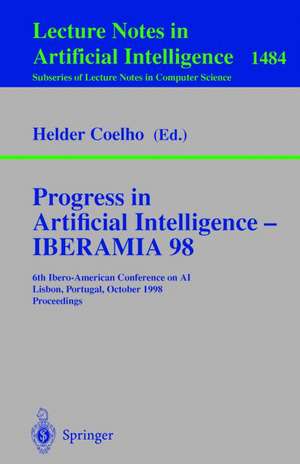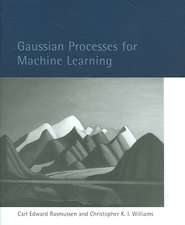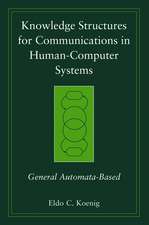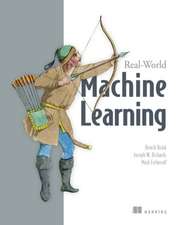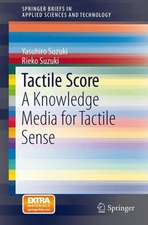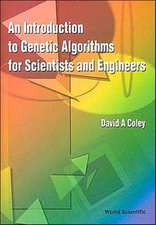Progress in Artificial Intelligence — IBERAMIA 98: 6th Ibero-American Conference on AI, Lisbon, Portugal, October 5–9, 1998 Proceedings: Lecture Notes in Computer Science, cartea 1484
Editat de Helder Coelhoen Limba Engleză Paperback – 9 sep 1998
Din seria Lecture Notes in Computer Science
- 20%
 Preț: 1061.55 lei
Preț: 1061.55 lei - 20%
 Preț: 307.71 lei
Preț: 307.71 lei - 20%
 Preț: 438.69 lei
Preț: 438.69 lei - 20%
 Preț: 579.30 lei
Preț: 579.30 lei -
 Preț: 410.88 lei
Preț: 410.88 lei - 17%
 Preț: 427.22 lei
Preț: 427.22 lei - 20%
 Preț: 596.46 lei
Preț: 596.46 lei - 15%
 Preț: 448.04 lei
Preț: 448.04 lei - 20%
 Preț: 353.50 lei
Preț: 353.50 lei -
 Preț: 389.49 lei
Preț: 389.49 lei - 20%
 Preț: 309.90 lei
Preț: 309.90 lei - 20%
 Preț: 645.28 lei
Preț: 645.28 lei - 20%
 Preț: 763.23 lei
Preț: 763.23 lei - 15%
 Preț: 580.46 lei
Preț: 580.46 lei - 20%
 Preț: 310.28 lei
Preț: 310.28 lei - 20%
 Preț: 655.02 lei
Preț: 655.02 lei - 20%
 Preț: 1183.14 lei
Preț: 1183.14 lei - 20%
 Preț: 340.32 lei
Preț: 340.32 lei -
 Preț: 449.57 lei
Preț: 449.57 lei - 20%
 Preț: 591.51 lei
Preț: 591.51 lei - 18%
 Preț: 938.83 lei
Preț: 938.83 lei - 20%
 Preț: 337.00 lei
Preț: 337.00 lei - 20%
 Preț: 649.50 lei
Preț: 649.50 lei - 20%
 Preț: 607.40 lei
Preț: 607.40 lei - 20%
 Preț: 1414.79 lei
Preț: 1414.79 lei - 20%
 Preț: 1024.44 lei
Preț: 1024.44 lei - 20%
 Preț: 583.40 lei
Preț: 583.40 lei - 20%
 Preț: 453.32 lei
Preț: 453.32 lei - 20%
 Preț: 575.49 lei
Preț: 575.49 lei - 20%
 Preț: 1075.26 lei
Preț: 1075.26 lei - 20%
 Preț: 585.88 lei
Preț: 585.88 lei - 20%
 Preț: 825.93 lei
Preț: 825.93 lei - 17%
 Preț: 360.20 lei
Preț: 360.20 lei - 20%
 Preț: 763.23 lei
Preț: 763.23 lei - 20%
 Preț: 340.32 lei
Preț: 340.32 lei - 20%
 Preț: 504.58 lei
Preț: 504.58 lei - 20%
 Preț: 369.13 lei
Preț: 369.13 lei - 20%
 Preț: 580.93 lei
Preț: 580.93 lei - 20%
 Preț: 343.62 lei
Preț: 343.62 lei - 20%
 Preț: 350.21 lei
Preț: 350.21 lei - 20%
 Preț: 583.40 lei
Preț: 583.40 lei - 20%
 Preț: 583.40 lei
Preț: 583.40 lei - 15%
 Preț: 438.59 lei
Preț: 438.59 lei - 20%
 Preț: 341.95 lei
Preț: 341.95 lei - 20%
 Preț: 238.01 lei
Preț: 238.01 lei - 20%
 Preț: 538.30 lei
Preț: 538.30 lei
Preț: 339.66 lei
Preț vechi: 424.58 lei
-20% Nou
Puncte Express: 509
Preț estimativ în valută:
64.100€ • 69.50$ • 54.19£
64.100€ • 69.50$ • 54.19£
Carte tipărită la comandă
Livrare economică 17 aprilie-01 mai
Preluare comenzi: 021 569.72.76
Specificații
ISBN-13: 9783540649922
ISBN-10: 3540649921
Pagini: 444
Ilustrații: XIV, 422 p. 213 illus., 6 illus. in color.
Dimensiuni: 155 x 235 x 23 mm
Greutate: 0.62 kg
Ediția:1998
Editura: Springer Berlin, Heidelberg
Colecția Springer
Seriile Lecture Notes in Computer Science, Lecture Notes in Artificial Intelligence
Locul publicării:Berlin, Heidelberg, Germany
ISBN-10: 3540649921
Pagini: 444
Ilustrații: XIV, 422 p. 213 illus., 6 illus. in color.
Dimensiuni: 155 x 235 x 23 mm
Greutate: 0.62 kg
Ediția:1998
Editura: Springer Berlin, Heidelberg
Colecția Springer
Seriile Lecture Notes in Computer Science, Lecture Notes in Artificial Intelligence
Locul publicării:Berlin, Heidelberg, Germany
Public țintă
ResearchCuprins
Invited Lectures.- Modelling Intelligent Behaviour: The Markov Decision Process Approach.- Emergence and Cognition: Towards a Synthetic Paradigm in AI and Cognitive Science.- The “Semantics” of Evolution: Trajectories and Trade-Offs in Design Space and Niche Space.- Searching the World Wide Web: Challenges and Partial Solutions.- Distributed Artificial Intelligence.- Groups and Societies: One and the Same Thing?.- From Mental States and Architectures to Agents’ Programming.- Genetic Integration in a Multiagent System for Job-Shop Scheduling.- A New Dynamic Model for a Multi-Agent Formation.- A Case of Multiagent Decision Support: Using Autonomous Agents for Urban Traffic Control.- Machine Learning.- Lazy Learning Algorithms for Problems with Many Binary Features and Classes.- GD: A Measure Based on Information Theory for Attribute Selection.- Robust Incremental Clustering with Bad Instance Orderings: A New Strategy.- Distributed Reinforcement Learning in Multi-agent Decision Systems.- Dynamic Discretization of Continuous Attributes.- Intelligent Collaborative Information Retrieval.- Reasoning.- Analysis of Agent Programs Using Action Models.- Bayesian Networks for Reliability Analysis of Complex Systems.- Temporal Representation and Reasoning for Dynamic Environments.- Heuristics for Improving the Non-oblivious Local Search for MaxSAT.- Integrating the Completion and the Well Founded Semantics.- Vision.- Recognition of Partially Occluded Flat Objects.- Estimating 3D Shape from the Optical Flow of Photometric Stereo Images.- Computer Vision Interaction for Virtual Reality.- Placing Artificial Visual Landmarks in a Mobile Robot Workspace.- Genetic Algorithms.- Selection Analysis in Genetic Algorithms.- Human Face Identification Using Invariant Descriptions and aGenetic Algorithm.- Using the Min-Max Method to Solve Multiobjective Optimization Problems with Genetic Algorithms.- A New Genetic Operator for the Traveling Salesman Problem.- Decision Queue Classifier for Supervised Learning Using Rotated Hyperboxes.- Knowledge Engineering.- SpADD: An Active Design Documentation Framework Extension Applied to Spatial Layout Design Problems.- A Systematic Approach for Building Ontologies.- Intelligent Tutoring Systems.- A Method to Diagnose the User’s Level.- Natural Language Processing.- Phonetic Classification in Spanish Using a Hierarchy of Specialized ANNs.- Neural Nets.- A Generalisation Study on Neural Corner Detection.- Constraint Programming.- Defeasible Constraint Solving over the Booleans.- Planning.- A Nonlinear Planner for Solving Sequential Control Problems in Manufacturing Systems.
Caracteristici
Includes supplementary material: sn.pub/extras
